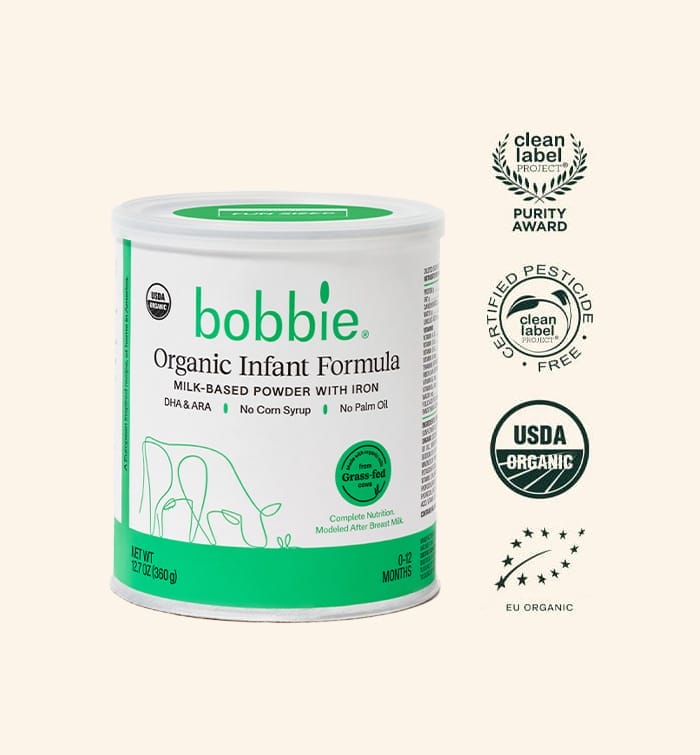We are proud to say that these posts are not sponsored. Our editorial team of Bobbie moms and writers personally select each featured product. If you buy something through our links, we may earn an affiliate commission, at no cost to you.
If you’ve been exclusively breastfeeding since your baby was born, the idea of combination feeding may be new to you. We don’t hear that much about combo feeding, but it’s something we should all be talking about! Combo feeding a baby can be a lifesaver. Literally, it helps when supply is low or when fresh breast milk is unavailable. Combo feeding can also be a savior for mom’s mental health. The question is, how do you introduce combo feeding and how do you find the combo feeding schedule that works best for your family?
To start from the beginning, combo or combination feeding simply means giving your baby both breastmilk and infant formula. If the word “formula” scares you, don’t be alarmed. Many exclusively breastfeeding moms fear the use of formula, and worry that it will somehow compromise their bond with their baby, or their baby’s nutrition.
The reality is, combination feeding is pretty common. Many moms begin by exclusively breastfeeding their baby and switch to combination feeding within weeks or further down the road. Some parents make the decision to begin combination feeding with their baby as a newborn. Some get here as a last resort. Often times the maternal health of mom or the health of the baby dictates that combination feeding become a necessity.
While we know that breast milk is the preferred method of nutrition for infants up to one year there may be instances when combination feeding is a better fit for a family.
Breastfeeding, even just once a day, is worth it.
Jadah Parks Chatterjee, Lactation Consultant
Reasons to try combination feeding
We all start out with a picture in our minds of how we’d like to feed our babies. Whether we imagine exclusively breastfeeding for 24 months, pumping exclusively, or combining formula and breastmilk, what we have planned usually does not go exactly as planned.
As such, there may be a myriad of reasons why you begin combination feeding:
- You’re having issues with your supply. You’ve tried all the things; the herbs, the lactation cookies, the additional feedings, the pumping, and you still aren’t able to keep up with your baby’s demands.
- You go back to work. Although an ideal scenario is one that involves you being allowed numerous pump breaks and a safe place to pump, some jobs just don’t lend themselves to comfortable pumping. If you aren’t able to pump at work, combination feeding might be a good idea.
- You’re ready to stop pumping. Maybe you’re doing great with morning and evening nursing, but you’d really like to wean from pumping during the day. If so, you’ll need something to make up for the breastmilk you aren’t pumping.
- Your baby isn’t gaining weight as she should. While this could be more of a supply issue, if your baby isn’t gaining weight like she should, her primary care provider may suggest you supplement with formula. In fact, the World Health Organization is clear that this is a situation when infant formula would be deemed medically necessary.

Shop Bobbie Organic Infant Formula
Bobbie Organic Infant Formula is a USDA Organic, EU-style infant formula that meets all FDA requirements. It is a complete nutrition milk-based powder modeled after breast milk and is easy on tummies. It is non-GMO and doesn't have corn syrup, palm oil, or maltodextrin. Learn more about Bobbie.
When can you start combination feeding?
Combo feeding assumes you are already breastfeeding successfully. In fact, establishing a good breastfeeding bond and routine is important before you introduce any kind of combination feeding. Feeding your baby breastmilk has considerable advantages that have been well documented.
Especially early on, breastmilk is beneficial for your baby’s:
- Oral development
- Immune system
- Ability to avoid allergies
- Overall nutrition
- Bonding time
Once breastfeeding has been well-established, you can safely introduce combination feeding.
Combination feeding newborn
There’s really no specific age that is best for introducing formula, bottles, or combination feeding; it is completely up to your goals and your baby’s health. You could start combo feeding your newborn, even by replacing formula for your nighttime feedings. Or, if you are returning to work after three months of maternity leave, you can get started on combination feeding several weeks prior to beginning work.
The longer you can keep your baby on your breastmilk only, the more health benefit she will receive from your milk. This doesn’t mean she will not receive benefit and nutrition from formula, it simply means she’ll receive the greatest benefit from breastmilk by having it as long as possible.
How to introduce formula to your baby
Babies are demanding, and they aren’t a huge fan of change. As such, it’s best to approach the introduction to formula slowly, over a period of time, and only when your baby is relaxed and hungry.
For instance, if you are planning to return to work, waiting until the week you return to introduce a bottle and formula isn’t a good idea. This is only going to create stress for both you and your baby. This is especially important if your baby has never taken a bottle before.
Your caretaker will need to be able to successfully feed your baby in your absence while you are at work, so it’s important you set your baby and caretaker up for success by introducing the bottle sooner rather than later.
You may want to start by replacing one feeding a day with a bottle and formula.
Essentially, you’d skip one nursing session and offer a formula bottle instead.
- Give this bottle while your baby has already been awake. First thing in the morning works well as they are hungry, awake and relaxed. You don’t want them to be overly hungry.
- Be patient. Don’t give up! Some babies struggle when switching from breast to bottle, and that is okay and normal. Your baby will take a bottle when she is hungry, so don’t worry that she will not be fed when you are not able to nurse her.
- Focus on your baby when bottle feeding. Bottle feeding is still a bonding experience, and it’s important you keep the feeding bond consistent. Focus on your baby the entire time you are feeding her to ensure the feeding bond is retained.
- Be specific with your formula. You have a lot of options when it comes to baby formula. Pick the one that has quality ingredients that are important for your baby’s health and doesn’t contain ingredients she doesn’t need. If the formula you pick doesn’t work for your baby, switch to another. Her primary care provider can help you determine a good formula for her use.
- Do keep formula feeding time and nursing time separate. Remember, babies don’t like change. It will be important for your baby to know she can expect her routine. Stick with bottle feeding times and nursing feeding times.
Combination feeding schedule
This is the routine that works specifically for you and your family. Many people like to replace their nighttime bottle with formula so that mom can get a little sleep. Working moms often prefer to extend breastfeeding by nursing when they’re home at morning and night, yet replace the daytime feedings with bottles. Plan this with your partner and/or caretaker to figure out the best routine for your specific schedule.
What if combo feeding doesn’t work?
It’s probably every breastfeeding working mother’s nightmare: what if combination feeding doesn’t work?
Let’s look at some of the most common fears associated with combination feeding and how to tackle them.
What if my baby won’t take a bottle? You’ve tried. Your partner has tried. Your mom has tried. Your baby just won’t take a bottle. After a few minutes of trying, you simply give up and offer the breast. We understand. It’s frustrating. But, we promise, your baby will take a bottle. You may need to switch to a different flow bottle or different type of nipple. If you’ve tried all the nipples, all the flows, and are still stuck, speak to your baby’s primary care provider about other options.
What if my baby hates formula? Babies are picky, but not typically picky when it comes to formula. If your baby outright refuses a particular brand, try a different one. Try giving your baby her formula just slightly warmer than room temperature to see if she will take it. If you are still having issues, contact her primary care provider.
What if my baby refuses the breast after having the bottle? If you do experience any kind of issue with nursing after beginning combination feeding, speak to your lactation consultant to get help. There’s always a way to get back on track with nursing, you just need a little guidance. In fact, if you are going back to work and will be away from your baby all day, you may find your baby nurses better in the mornings and evenings.
Conclusion to combo feeding
Combination feeding is a great way to introduce formula to an exclusively breastfed baby over a period of time. It can help fill in nutritional gaps for moms who have issues with their supply, and can also ease the pressure of returning to work and pumping numerous times a day and night.
If possible, you should always wait until breastfeeding is fully established before introducing formula and a bottle to your baby, but know that if you have need to introduce it sooner, it is possible and can be successful.
If you need guidance, reach out for support to your lactation consultant, and always keep your baby’s primary care provider in the loop of any dietary changes you are making with your baby.

Shop Bobbie Organic Infant Formula
Bobbie Organic Infant Formula is a USDA Organic, EU-style infant formula that meets all FDA requirements. It is a complete nutrition milk-based powder modeled after breast milk and is easy on tummies. It is non-GMO and doesn't have corn syrup, palm oil, or maltodextrin. Learn more about Bobbie.
Sources:
Acceptable Medical Reasons for use of Breast Milk Substitute | WHO
11 Benefits of Breastfeeding for Both Mom and Baby | Healthline
Formula Feeding | Healthy Children

